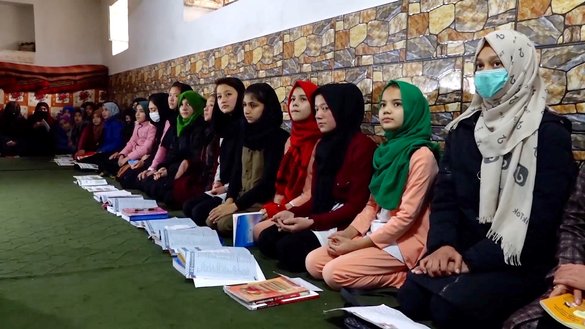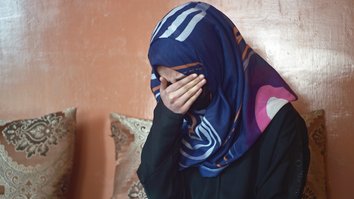KUNDUZ -- As Afghan women find themselves more and more restricted in their movement and personal freedoms, one woman, a teacher who is now unemployed, has turned her house into an education centre for children.
A graduate of Balkh University's faculty of journalism in 2020 and former teacher at a private school in Mazar-e-Sharif, Malika Azizi now teaches English, Dari, writing and mathematics to a group of 60 young girls and boys for free.
Her purpose is to prevent girls from becoming illiterate and to promote a culture of education, she said.
It also fills a gap for students whose learning has been interrupted by the fall of the Afghan government in August and the three-month winter break when schools are closed.

Girls are seen in this video screenshot on January 21 in Mazar-e-Sharif, Balkh province, as they attend classes in the basement of Malika Azizi's house. The unemployed teacher turned her house into a free education centre following the collapse of the Afghan government last August.
"When I saw my Afghan sisters barred from working outside their homes and pursuing their education, I decided to establish a girls' education centre in my basement," she said.
"The centre opened its doors on January 17 and has 60 school-aged students, 65% of whom are girls," she said.
"In addition to English, I am teaching them writing skills, Dari and mathematics so that students are prepared to resume their education when schools restart," she said.
Azizi's students have to sit on the floor as she could not afford to buy desks, chairs, computers and a projector, which she said she "desperately" needs.
Overcoming obstacles
"Even if our school is closed, now there is someone who teaches us not only lessons but also how we can progress in life," said Tahira Mubariz, a 10th grade student at Khorasan High School in Mazar-e-Sharif.
Her studies have been affected over the past two years by political changes and the coronavirus pandemic, she said. However, programmes like the one she attends at Azizi's will help her prepare for the next school year.
"Unfortunately, restrictions have recently been imposed on girls' and women's education," Tahira said. "However, we will never give up and are determined to continue our education and build our country."
"We shall not bow to any pressure," she said. "We will overcome any obstacles on the path to our education. Seeking education is our legitimate right."
"Since I came here, I feel a lot has changed," said Zohal Akrami, another 10th grader at Khorasan high school. "In the beginning, I knew only a few English words, but now I have learned many more and my pronunciation skills have improved."
"The winter education programme has proved to be very useful because schools are closed and we can better prepare ourselves for the future," she said.
"I want to be a doctor in the future and serve vulnerable women for free," she added. "Nobody should create obstacles to our progress because our purpose is good."
Women must learn
Despite the restrictions women and girls face, a number of Balkh residents said education is very important for women and girls and they should be allowed to study.
It is important for women to study so that they can serve their fellow women in the future, said Safatullah Haqiq, a resident of Mazar-e-Sharif.
"Society needs female doctors, teachers, police officers, judges and prosecutors," he said. "Because [Afghan] society is very conservative, a man may not search a woman and a male doctor may not treat a female patient."








Continues... 4. The government should not cut taxes from the teachers’ salaries and the teachers’ salaries should be paid in full. 5. The government should provide a special discount for teachers in paying government fees such as electricity bills, municipality cleaning bills, passport fees and other governmental documents, republican taxes for house or a shop owned by a teacher, etc. 6. Government laws for teachers must be different and exceptional from other classes of the people. Rewards, punishments and all principles for teachers should be different from other people. For example, the punishment for a teacher who takes illegal advantage of a teacher’s position should be very heavy. If a teacher commits a crime, teaches anti-government, anti-national interests, anti-national unity, or other fanatical and divisive ideas, he must be severely punished, he must be denied the titles he has earned and should be revoked of his privileges, and later he should be imprisoned. This means, it should not be the case that the teacher does whatever he wants and no one can confront the teacher. 7. Teachers should also be classified in terms of teaching disciplines, meaning that the privileges for a literature’s teacher should be different from that of a science teacher. Teachers of elementary classrooms need to be more credible because they lay the foundations for the training of students and they are responsible for shaping the students’ initial training. 8. Other similar measures have t
Reply5 Comment
Continues... The required marks for the teachers' training or education faculties in the Kankor exam are low, because teachers have no privileges and no value in the Afghan society and the salaries paid to the teachers are next to nothing, and how will it be possible for a society to develop and make progress, in which the teachers are so worthless and less important? How is it possible for learning and teaching to be valuable in such a society? How is it possible for us to have qualified, patriotic and quality scientists and teachers who could make progress parallel to the world, in such a society? The answer is obviously clear that this is not possible. So where is the problem? And how can we solve this problem? My suggestions for solving this problem are as follows: 1. Teachers' salaries should be the highest salaries among all the governmental departments of the country, which in addition to addressing the daily needs of the teachers, should even be left out, so that the teachers can buy a house, buy a car, establish a tuition center or even donate money to others. For example, a teacher's salary should be at least 100000 Afghani. 2. The teachers’ training and education faculties should require the highest marks in the list of studying majors of Kankor exam, so that everyone cannot qualify for it, and so that untalented people cannot become the teachers of our children. Only the ones should become teachers who have the highest talents and the most knowledge, and after beco
Reply5 Comment
Very good job. Praises to the real heroes of my homeland who really have chosen serving their people and country, a purpose of their lives. I have a suggestion for the new government and the future governments of Afghanistan, the implementation of which will make future generations more intelligent and civilized. With all due respect to Afghan teachers, unfortunately people who become teachers in Afghanistan, most of them are/were those who do not have the ability to pursue any other jobs, I don’t mean to insult anybody but this is the bitter truth. During the schooling period, the classrooms of each school have three types of students: The first type are the excellent and talented students, most of whom study the faculties of medicine, engineering, law, science, modern technology, etc. and most of them become successful in the future lives. The second type are the average students who later studies in the fields of literature, psychology, history, geography, sharia, sociology, etc. and later they generally occupy good jobs in the future and earn good livelihoods. The third type are the students who are only literate or maybe not literate at all, and have very little talent for higher education, and during the Kankor exam, they do not qualify for any other university than the teachers' training centers. This type of students will go and become teachers in the future. And then, we also complain about why our country's education is substandard and of poor quality. In the Kankor
Reply5 Comment
I always read your reports, but so far, I have not seen any information from the east of Afghanistan (Nangarhar, Kunar, and Laghman) to read and feel relaxed with and know what is going on in the eastern part of Afghanistan, what new changes (positive and negative) have occurred in. Nangarhar, known as the cradle of science and literature, once had a lot of news besides development talks. Still, I have not read on your site yet what has changed with the advent of the new government of Afghanistan in these provinces, what is the condition of the people, whether they have problems or not, they have made progress, they are compelled like other provinces ...? It is not that I am discriminating. Still, as a reader of the Salaam Times, I have the right to be informed of the situation in the eastern provinces. Afghanistan is not a three province that always read the news/report, see! Afghanistan comprises 34 provinces from east to west and from north to south which, 's information needs to be published. We thank you in advance!
ReplyThey do not write on Kandahar too. I think they intentionally do not want to write on the difficulties of the Pashtun populated areas.
Reply5 Comment